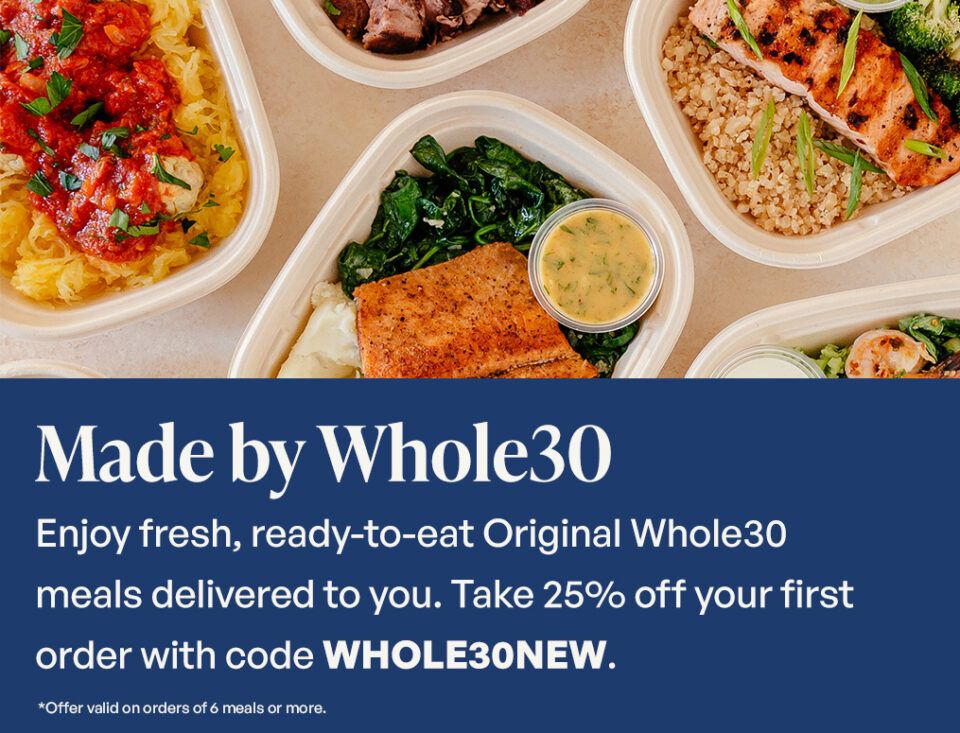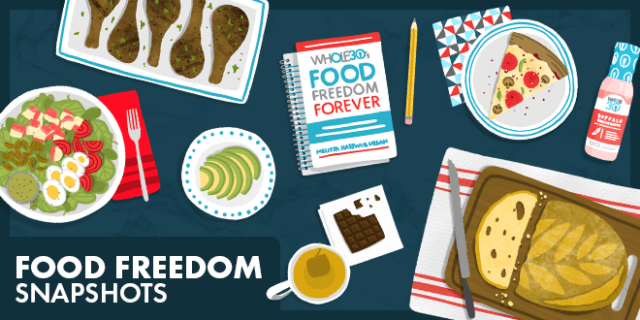This article is part of our special Food Freedom resources meant to support you in your life after Whole30. Click here to see our entire collection of resources.
So often, people think of the Whole30 as the end-all, be-all… you do the Whole30 and finish with a graduation certificate, bragging rights, and a wheelbarrow full of #NSVs (non-scale victories). Which is awesome, don’t get me wrong.
But the Whole30 isn’t the END of your journey as I envision it. It’s just the stepping stone to the REAL end-game… your Food Freedom. You know, the place where you feel in control of food, and food doesn’t control you. The place where you eat the culturally-significant, family-traditional, or just-plain-delicious foods while still looking and feeling exactly as good as you want to look and feel. The place you can sustain indefinitely, living by your OWN rules, happily navigating your own path and never needing to “diet” again.
That’s what the Whole30 is all about… the first step towards life-long Food Freedom, according to your definition. And your Food Freedom hinges on one critical question… Is it worth it?
Is It Worth It? Let Me Work It.
Your Food Freedom starts with your own personal decisions about “worth it” foods and drinks. You’ll hear this phrase so often throughout Food Freedom Forever that it’s worth defining: “Worth it” is anything you know will likely have negative physical or psychological consequences, but is so special, enjoyable, or significant that you choose to eat it anyway.
The key to “worth it” is that you have to decide this for yourself—I can’t do it for you. (That’s also very good news, because someone else making decisions for you isn’t exactly “freedom.”) The bowl of ice cream that you know, thanks to reintroduction, will make your skin break out—is that worth it? Maybe it is, because you love ice cream that much. Good for you! Enjoy, and deal with the consequence.
Maybe it’s not, because maintaining clear skin is way more important than five minutes of creamy, cold happiness. That’s all good, too. The key is making the decisions and holding yourself accountable; declining when you decide something just isn’t worth it, even if it’s tempting.
You already have a good idea about “worth it” foods and beverages based on your reintroduction experience. If you reintroduced something and it went horribly wrong (digestive distress, energy disruptions, pain or inflammation, a return of symptoms), it’s probably safe to assume you’ll be leaving that food out of your general Food Freedom plan.
For me, this is goat cheese. That particular cheese makes me feel like that guy on the gurney in the first Alien movie—the one who has that creepy worm thing unceremoniously burst out of his body. For that reason, it’s never worth it, and I’ll go out of my way to ensure I’m not accidentally exposed to it in a salad or appetizer. Even if the Pope himself offered me goat cheese, I would politely say, “No, thank you, your Holiness,” but I wouldn’t tell him why, because holy TMI.
Worth It, Expanded
“Worth it” isn’t just about the physical consequences; it’s also about evaluating how a particular food affects your brain, your emotional attachment to other foods, your willpower, and your cravings. Some foods won’t impact your energy, sleep, or digestion, but they’ll leave you craving sugar or carbs like crazy; for example, many Whole30ers report that eating something salty automatically makes them want something sweet.
You may discover that other foods (or drinks—I’m looking at you, alcohol) are “gateway foods,” bringing to mind associations or past experiences that make you automatically reach for other less-healthy foods. Some foods may impact you in both ways; gluten (if you’re sensitive to it) can contribute to both digestive distress and mental health conditions like depression and seasonal affective disorder.
The emotional and psychological side effects of eating these potentially less-healthy foods are just as significant as the physical consequences, so make sure you take them into account during your “worth it” evaluations.







